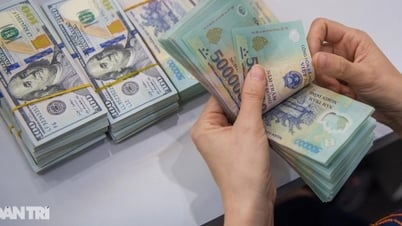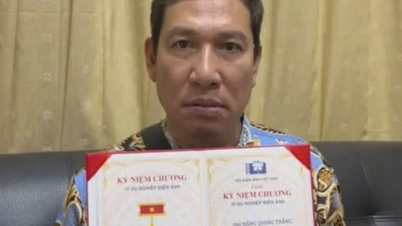At the end of June 4, the price of SJC gold bars listed by businesses was VND114.9 million/tael for buying and VND117.2 million/tael for selling, stable compared to the previous day but still higher than the world gold price by more than VND10 million/tael. To narrow the gap, according to experts, it is necessary to soon eliminate the monopoly of SJC gold bars as directed by General Secretary To Lam recently, along with many other synchronous solutions.
The market cannot be "one-stop"
Speaking to a reporter from Nguoi Lao Dong Newspaper, Mr. Nguyen Tu Mi, General Director of Mi Hong Gold Company, said that the company is one of 38 enterprises licensed to trade in gold bars since 2012 under Decree 24/2012/ND-CP of the Government . "For more than a decade, Mi Hong has not only participated but also witnessed every ups and downs of this market, clearly understanding what the monopoly mechanism brings, both positive and negative aspects. We support the policy of eliminating monopoly. Because a market that wants to develop must have competition, must have many choices" - Mr. Tu Mi said.

Gold transaction at Mi Hong Gold Company (Binh Thanh District, Ho Chi Minh City). Photo: HOANG TRIEU
According to this enterprise, when many units join the supply chain, the source of goods will be more abundant, domestic prices will be closer to world prices, there will be no more gaps that cause insecurity for people and disorder in the market. The market will be more transparent, wider and fairer. Enterprises with foundations, systems, and well-planned strategies will have the opportunity to expand their operations, even beyond their previous limits.
"If more qualified businesses join, the market will reflect supply and demand more accurately, and prices will be less manipulated by psychological factors or false rumors. The gap between domestic and world gold prices will be narrowed. Thanks to the expanded supply, unusual fluctuations due to local scarcity will be reduced. If the policy allows the import of raw gold in a transparent manner, it will not only serve the domestic market but also pave the way for exports," said Mr. Tu Mi.
Dr. Nguyen Tuan Anh, lecturer in Finance - Faculty of Business, RMIT University Vietnam, commented that the above difference reflects the scarce supply of gold bars due to the monopoly of production by the State Bank of Vietnam (SBV) through Saigon Jewelry Company (SJC) and the restriction of gold imports since 2012. As a result, the domestic gold market is isolated, gold smuggling increases, putting pressure on the exchange rate and foreign exchange reserves.
"Allowing many enterprises to produce gold bars is feasible if there are clear licensing criteria (capital, technology, reputation), similar to the way Singapore manages recognized gold suppliers. Or expanding gold imports on the condition that the State Bank can control foreign currency flows, like the way India uses import taxes to regulate the amount of imported gold, instead of an overall quota. However, it also depends on the construction of a tight legal framework and the supervision capacity of the State Bank," Dr. Nguyen Tuan Anh proposed.
Dr. Nguyen Tuan Anh cited India's application of flexible import quotas, combined with import tax adjustments. Specifically, they limit gold imports to 140 tons in the 2023-2024 period, ensuring control of gold flows while still meeting market demand.
"Vietnam can apply a similar model, setting annual import quotas based on domestic demand and macroeconomic conditions. In addition, applying blockchain technology to track the origin and circulation of gold, similar to the model of the Dubai Multi Commodities Center (DMCC), will ensure transparency and minimize the possibility of price manipulation," the expert suggested.
Open to where?
Economist, Associate Professor, Dr. Ngo Tri Long also agreed that it is necessary to allow controlled gold imports. "Considering policy amendments and allowing gold imports for qualified businesses is necessary to promote competition, stabilize the market and protect consumer rights.
"We should not allow pure gold imports through bidding, but rather grant controlled quotas based on actual capacity, business efficiency, compliance with the law and transparent audit results. This approach not only ensures fairness - efficiency - transparency but also increases healthy competition, limits group monopoly and speculation in the gold market," said Associate Professor, Dr. Ngo Tri Long.
According to experts, to what extent should marketization be applied to ensure sustainable development and still avoid speculative risks? Because although reforming the gold market brings benefits, it also carries risks. Liberalizing gold imports can increase pressure on foreign exchange reserves; eliminating the monopoly on gold bar production, if not tightly controlled, can lead to market disruption, reducing gold quality and consumer confidence.
Dr. Nguyen Tuan Anh suggested that in order to effectively market Decree 24, managers need to establish a delicate balance between liberalization to increase gold supply and maintaining tight control to prevent speculative risks - which is the main cause of instability in domestic gold prices.
The level of marketization needs to be built on the principle of promoting competition but not completely floating, ensuring the market operates transparently and stably. "Regarding gold bar production, instead of monopolizing the SJC brand, the state can license a few large enterprises that meet strict standards such as minimum capital, modern technology and market experience to participate in production.
This model is similar to how Australia operates with factories like the Perth Mint, where competition is encouraged but still subject to close government supervision. For gold imports, granting annual quotas, equivalent to domestic demand, to qualified businesses will help control foreign currency flows, avoid gold price inflation, and gradually remove the current import ban," Dr. Nguyen Tuan Anh analyzed.
Monitoring foreign currency flows is a key factor in protecting the exchange rate and foreign exchange reserves if businesses are allowed to import gold. Some experts suggest that the SBV should coordinate closely with the Ministry of Finance to monitor cash flows, similar to how China requires all imported gold shipments to be approved by the People's Bank of China (PBoC) through a license. In China, major banks such as ICBC, HSBC and ANZ are granted import quotas, ensuring centralized control while still allowing the market to operate.
Gold exchanges must be managed by the State.
Associate Professor Dr. Nguyen Huu Huan, lecturer at the Ho Chi Minh City University of Economics (UEH), said that the domestic gold market is currently dominated by a few units, causing domestic prices to be much higher than the world price. The establishment of a national gold trading floor, with the participation of many enterprises, will create a transparent price level, approaching the international price. "This is a big process, requiring the coordination of many ministries and branches. If it is done privately, it will be fast but risky, like the period before 2012 when many spontaneous gold trading floors caused fraud and losses. The national gold trading floor must be controlled and strictly managed by the State," Mr. Huan emphasized.
Source: https://nld.com.vn/xoa-doc-quyen-vang-sjc-cach-nao-196250604205309959.htm























































































![[OCOP REVIEW] Tu Duyen Syrup - The essence of herbs from the mountains and forests of Nhu Thanh](https://vphoto.vietnam.vn/thumb/402x226/vietnam/resource/IMAGE/2025/6/5/58ca32fce4ec44039e444fbfae7e75ec)












Comment (0)